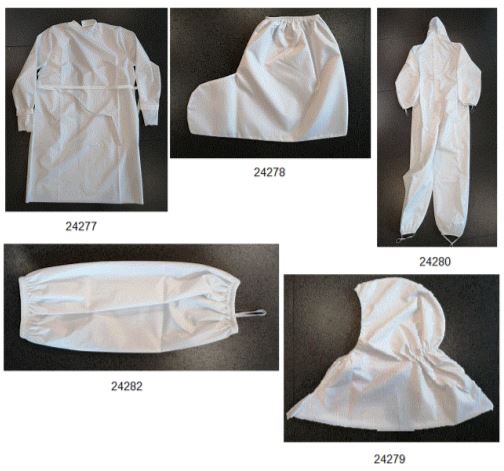The emerging threat of infectious diseases has reinforced the importance of the need for efficient personal protective equipment (PPE) to protect not only health professionals, but also patients and visitors.
According to the National Preparedness and Response Plan for the disease by the new coronavirus (COVID-19) of the General Directorate of Health (DGS), an EPI is defined as a set of protective barriers, used with the objective of protecting mucous membranes, skin and clothing, from contact with infectious agents, which may include gloves, masks, respirators, glasses, visors, caps, aprons, gowns, footwear protection or others that are considered necessary.
The proper use of PPE aims to protect not only the health professional, but also the patient, from contact with transmissible agents, being the responsibility of each professional to choose and adapt it to each situation. In this particular case, it appears that due to the characteristics of the virus, the pathological consequences are more severe in the elderly, about 91% of deaths in Portugal were aged 70 years or over, with 1/3 of these deaths occurring in nursing homes. In this sense, it is important to protect health professionals who deal with the virus on a daily basis, so that they are not active agents for its transmission.
It is also verified that part of the protections that are used in PPE are manufactured in disposable materials and with a strong dependence on foreign markets, especially in Asia.
Goals
Develop PPE that can be reusable, contributing, on the one hand, to reducing this dependence and on the other hand, to reducing environmental pollution. The existing solutions act only as physical barriers to virus penetration, and the current level of knowledge already offers a set of solutions that are active, that is, with the ability to act on microorganisms through the incorporation of functionalization agents.
The project aims to develop a new generation of reusable PPE (gowns, coveralls, cogulas, caps, leggings, shoe protectors, cuffs and masks) for use in a professional context (nursing homes, firefighters, among others).
Innovation
Reusable textiles have numerous societal advantages from the environmental aspect, public health and also in physical properties and performance.
Considering the principle of waste generation, there are several studies that prove the inefficiency of disposable products. A study carried out by the company Teknik Energy & Enviroment presented data on the impact of surgical gowns, with the smallest impact caused by reusable materials being remarkable at the end of the study.
In terms of physical properties and performance, it should be noted that in addition to the reusable materials that can be recycled, they present less release of particles during their lifetime and are also more comfortable for the user (in shape and in thermophysiology).
Results
The use of PPE in a hospital environment and similar situations is essential to protect the body areas exposed to infectious agents. In the case of health professionals, it is verifiable that they are regularly in contact with unwanted agents - clothing, blood, body fluids or secretions - the use of PPE is fundamental in the general strategy for the control of infectious agents. In the Sonix project, the developed PPE have real benefits for this control:
• Application of reusable surgical textiles with additional level of protection to combat the wear and tear associated with reusable materials.
• Mechanical resistance superior to the requirements of EN 13795 (tensile strength).
• Compliance with the European Union medical device directive.
• Comfort and breathability.
• Guarantee of “barrier effect” to reduce the transfer of agents to and from the user.
• Reduced environmental impact and costs compared to disposable PPE.
• Less release of particles during periods of use and greater homogeneity, essential in resistance to the penetration of liquids.
Datasheet
The POCI-02-08B9-FEDER-071806 project was promoted by the Empresa de Malhas Sonix S.A.
